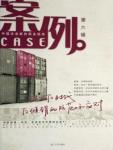Chapter 1 Editor-in-Chief's Words "Engineer + Gambler"
Cases (Sixth Series): Prevention and Response to Anti-dumping in the Post-WTO Era
吴晓波
1400Words
2018-03-18
They tend to have better professionalism, and at the same time, they have an unstoppable passion for gambling, daring to risk their lives.
Regarding the failure of entrepreneurs, Chris Achilles, a professor of management at Harvard Business School, once wrote: "Many people with professional knowledge and great talent can almost always do what they set out to do, so they are very They rarely fail. And because they fail so rarely, they never learn how to learn from failure."
In recent years, China's business circles have suffered repeated defeats. Compared with the many reckless figures in the mid-1990s, an impressive difference is that many of them have enviable high degrees, and some of them are professors (Song Ruhua) ), an inventor (Gu Chujun), a doctor (Yang Rong), a military doctor (Zhao Xinxian), a writer (Lv Liang), a master’s student and a student in the executive class of Harvard Business School (Sun Hongbin), etc.; they are not indifferent to risks, Top’s Song Ruhua paid special visits to Mou Zhong and Shi Yuzhu who were in distress at the beginning of their business, and asked them face-to-face for lessons from failures; even in terms of company standardized management and strategic design, these companies are not the same as those of the year. Brilliance, Delong, Companies such as Sanjiu and Jianlibao used to hire the world's best consulting companies for their services. Delong's Tang Wanxin even has a strategic department with 150 researchers.
However, we still see the sudden fate of defeat.They all seem to be inexhaustible, and their internal connections are very complicated.From the public's point of view, the appearance and internal causes of their overturning always seem to be shrouded in an inexplicable fog.However, when we sorted them out completely, we found that although the scale of these enterprises has been much larger than that of Sanzhu, Qinchi, etc., in terms of the "technical content" of failure, it seems that they have not improved. signs.
They still fall into two factors:
First, it violates the basic logic of business.The vast majority of failures are still related to common sense, as we can see in cases such as Topp and Sunco: when an entrepreneur ventures ahead, all industry leaders and he himself know that it will be an extremely dangerous big Leap forward.It does not conform to the logic of a company's normal growth, and cannot guarantee regular operations in terms of cash flow, teamwork, and operational capabilities, so their final overturning has become a "natural" ending.In these defeats, we have repeatedly drawn the conclusion that all failures are due to ignoring the most basic principles of business management and losing the grasp of the essence of management.
The second is the expansion of entrepreneurs' inner desires.For entrepreneurs, it is difficult for you to distinguish the difference between "ambition" and "dream".Napoleon's famous saying "a soldier who doesn't want to be a marshal is not a good soldier" has been quoted so many times that it always seems to hold true.This is an arena that does not pay attention to origin and background. Opportunities always belong to those who have the courage to pursue.However, business is a game of restraint after all, and any desire beyond the limit of ability will lead to dire consequences.
In recent years, we have seen more of a "engineer + gambler" business personality model.They tend to have good professionalism, superhuman intuition and operational talent in certain fields. At the same time, they have an unstoppable passion for gambling, and dare to risk their lives when the opportunity comes.This is the most thrilling jump in the career of an entrepreneur. The winners will go to heaven, and the losers will fall to hell. Its delicate control depends entirely on the timing, location and harmony of people.
Nothing is certain in business.
If Sun Hongbin is satisfied with being a local real estate king in Tianjin, if Dai Guofang does not go to build his big steel factory by the Yangtze River, if Song Ruhua concentrates on managing a software park, if Gu Chujun buys Kelon and does not make other acquisitions, if Tang Wanxin is Just focus on his "Troika"...then, maybe all the defeats will not happen.However, such an assumption is untenable, because they rose in a frenzied business century, which gave people in it too much temptation and room for imagination, and it made everyone dream that they would become A man above and beyond the ordinary.Therefore, the best and worst endings are often two sides of the same coin.
This is not to say that all tragedies are inevitable.On the contrary, if leapfrog growth is the path that Chinese enterprises dare to choose, then how to avoid and eliminate all crises as much as possible in such a process is a very urgent proposition.

